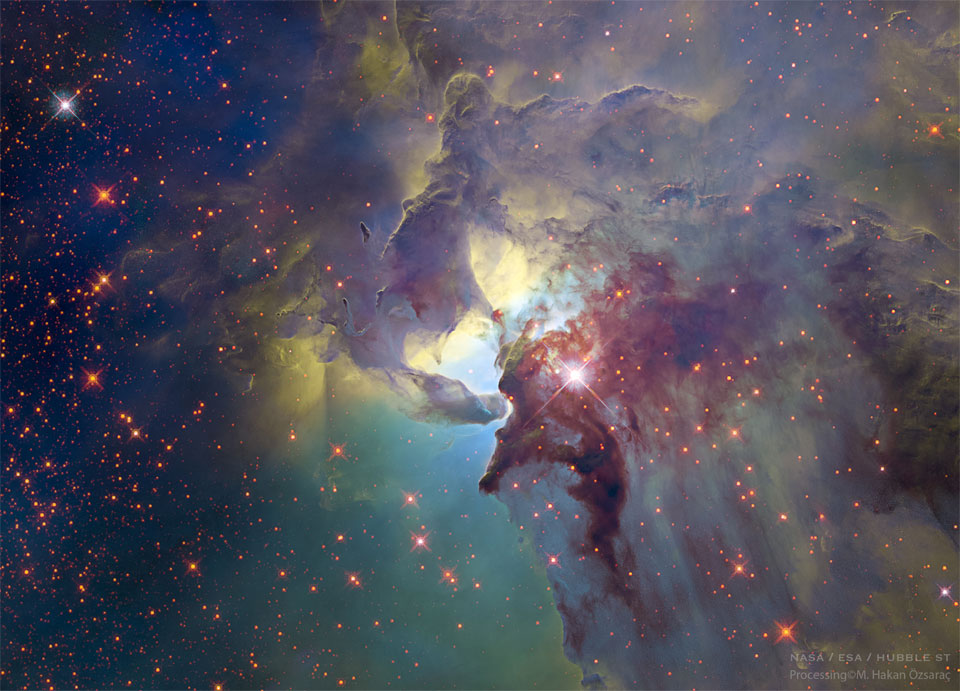Page 1 of 1
Are space storms a thing?
Posted: Sat Aug 31, 2024 7:38 pm
by Robinegg
If you watch scifi shows you’ll notice that to create conflict space ships are subjected to a whole lot of dangerous storms in space analogous to hurricanes and rogue waves to terrestrial ships. “Ion storms”, a “nebula” that wreaks havoc, etc. Have astronomers found anything like that? Assuming a defense to random high speed particles is part of the hull.
Re: Are space storms a thing?
Posted: Sat Aug 31, 2024 7:43 pm
by Chris Peterson
Robinegg wrote: ↑Sat Aug 31, 2024 7:38 pm
If you watch scifi shows you’ll notice that to create conflict space ships are subjected to a whole lot of dangerous storms in space analogous to hurricanes and rogue waves to terrestrial ships. “Ion storms”, a “nebula” that wreaks havoc, etc. Have astronomers found anything like that? Assuming a defense to random high speed particles is part of the hull.
Basically, everything in space is a hard vacuum, including dense nebulas. If you're flying a spaceship around, you'll never see or feel clouds or particles. There is dust everywhere, although at very low densities, and if you're traveling fast enough that will certainly damage or even destroy your hull. Indeed, that is one of the biggest arguments against being able to travel at relativistic speeds. And, of course, there are charged particles which can exist in sufficient density to pose a major health hazard without appropriate shielding. All of this is invisible, of course, and would not produce any sort of buffeting or turbulence or anything "storm like".
Re: Are space storms a thing?
Posted: Sun Sep 01, 2024 4:49 am
by Ann
Chris Peterson wrote: ↑Sat Aug 31, 2024 7:43 pm
Robinegg wrote: ↑Sat Aug 31, 2024 7:38 pm
If you watch scifi shows you’ll notice that to create conflict space ships are subjected to a whole lot of dangerous storms in space analogous to hurricanes and rogue waves to terrestrial ships. “Ion storms”, a “nebula” that wreaks havoc, etc. Have astronomers found anything like that? Assuming a defense to random high speed particles is part of the hull.
Basically, everything in space is a hard vacuum, including dense nebulas. If you're flying a spaceship around, you'll never see or feel clouds or particles. There is dust everywhere, although at very low densities, and if you're traveling fast enough that will certainly damage or even destroy your hull. Indeed, that is one of the biggest arguments against being able to travel at relativistic speeds. And, of course, there are charged particles which can exist in sufficient density to pose a major health hazard without appropriate shielding. All of this is invisible, of course, and would not produce any sort of buffeting or turbulence or anything "storm like".
Wouldn't we feel anything "storm like" at all even if we passed right through the tornado-like center of the Lagoon Nebula?
Ann
Re: Are space storms a thing?
Posted: Sun Sep 01, 2024 4:56 am
by Chris Peterson
Ann wrote: ↑Sun Sep 01, 2024 4:49 am
Chris Peterson wrote: ↑Sat Aug 31, 2024 7:43 pm
Robinegg wrote: ↑Sat Aug 31, 2024 7:38 pm
If you watch scifi shows you’ll notice that to create conflict space ships are subjected to a whole lot of dangerous storms in space analogous to hurricanes and rogue waves to terrestrial ships. “Ion storms”, a “nebula” that wreaks havoc, etc. Have astronomers found anything like that? Assuming a defense to random high speed particles is part of the hull.
Basically, everything in space is a hard vacuum, including dense nebulas. If you're flying a spaceship around, you'll never see or feel clouds or particles. There is dust everywhere, although at very low densities, and if you're traveling fast enough that will certainly damage or even destroy your hull. Indeed, that is one of the biggest arguments against being able to travel at relativistic speeds. And, of course, there are charged particles which can exist in sufficient density to pose a major health hazard without appropriate shielding. All of this is invisible, of course, and would not produce any sort of buffeting or turbulence or anything "storm like".
Wouldn't we feel anything "storm like" at all even if we passed right through the tornado-like center of the Lagoon Nebula?
Ann
You wouldn't even know you were in a nebula.
